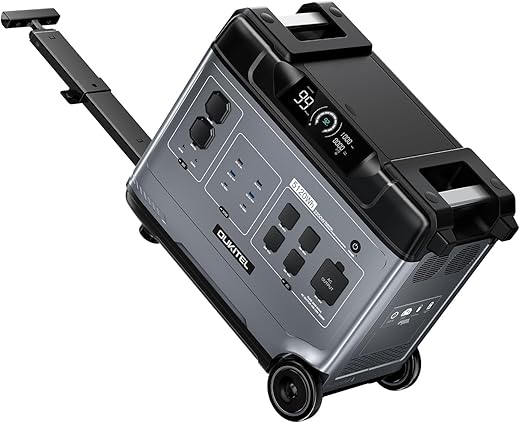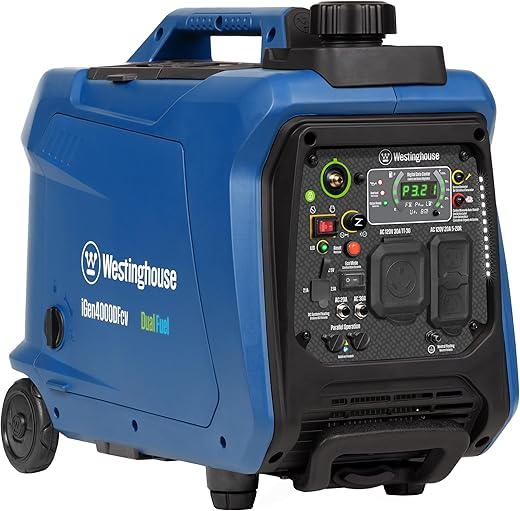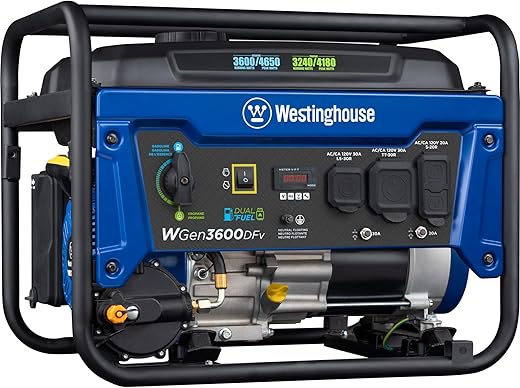As the demand for sustainable energy solutions continues to grow, solar generators have emerged as a practical alternative for providing clean power in various settings. In this roundup, I will explore the five best solar generators currently available, highlighting their features, efficiency, and suitability for different needs. Whether you’re looking for backup power during outages, a reliable energy source for outdoor activities, or a way to reduce your carbon footprint, these options collectively demonstrate the potential of harnessing solar energy effectively.
OUKITEL P5000 Solar Power Station
The OUKITEL Portable Power Station P5000 offers a remarkable 5120Wh capacity, making it an ideal solution for powering a wide range of home devices—from refrigerators to washing machines. With its pure sine wave inverter, it ensures a stable voltage, protecting my devices from potential damage. I appreciate how its seamless UPS function shields sensitive equipment from data loss during electrical outages, giving me peace of mind.
Weighing about 25 kg and designed to be smaller and lighter than conventional power stations, the P5000 is easy to maneuver thanks to its high-quality drawbar and wheels. Its 15 versatile outputs allow me to charge multiple devices simultaneously, and I can recharge it in just 2.8 hours using a wall outlet. Overall, this power station has proven to be a reliable and efficient backup power source for my home and outdoor adventures.
EF ECOFLOW DELTA Pro Solar Generator
The EcoFlow DELTA Pro 3 Solar Generator is a game-changer for anyone needing reliable power both at home and on the go. With an impressive 4000W output and the ability to support both 120V and 240V appliances, I can confidently power everything from a central air conditioner to a water pump without the hassle of fuel refills. Its 4000Wh battery capacity, expandable up to 48kWh with additional batteries, ensures that I have sufficient backup power to last 2-4 days during emergencies or power outages.
What I appreciate most about the DELTA Pro 3 is its user-friendly design and versatility. The plug-and-play setup allows me to connect various devices quickly, while its silent operation means I can use it indoors without disturbance. The EcoFlow app further enhances my experience by enabling remote monitoring and control of power usage. Overall, the 5-year warranty and excellent customer support give me peace of mind that EcoFlow stands behind their product.
EF ECOFLOW DELTA2 Solar Generator
The EF ECOFLOW Solar Generator DELTA2 is an excellent solution for those seeking reliable power while camping or during unexpected outages at home. With a robust 1024Wh LFP battery, this generator ensures longevity and extensive power supply, offering 1800W output across 15 outlets, enough to run essential appliances like refrigerators or microwaves. The included 220W Bifacial solar panel further enhances sustainability by capturing up to 25% more energy, making it perfect for off-grid adventures.
I appreciate the DELTA2’s fast charging capability, achieving a 0-80% charge in just 50 minutes, which is incredibly efficient for quick recharges on-the-go. The user-friendly app and clear digital display allow seamless monitoring and operation, ensuring I can keep track of power usage in real-time. Whether I’m setting up camp or preparing for a blackout, the DELTA2’s expandable capacity and solid construction give me peace of mind and versatility for any situation.
EF ECOFLOW RIVER 2 Max Solar Generator
The EF ECOFLOW RIVER 2 Max Solar Generator redefines portable power solutions with its impressive output and rapid charging capabilities. This lightweight powerhouse can charge to 100% in just 60 minutes and supports up to 1000W, allowing me to simultaneously run multiple devices—ideal for both outdoor adventures and home backup needs. Its advanced LiFePO4 battery technology not only ensures an extended lifespan of over 3000 cycles but also guarantees reliable performance, even in demanding conditions.
Equipped with a 160W solar panel and versatile charging options, the RIVER 2 Max is perfect for camping trips or unexpected power outages at home. I appreciate its compact design and user-friendly interface, which includes an LCD display for monitoring power usage. Whether I’m powering essential appliances during blackouts or enjoying time outdoors with friends, the RIVER 2 Max has consistently exceeded my expectations, making it a valuable investment for anyone seeking reliable, renewable energy.
OUPES Mega 5 Solar Generator 4000W
I’m impressed by the OUPES Mega 5 Solar Generator, which boasts an impressive 4000W capacity and a robust 5040Wh power station. The safety features, including the LiFePO4 battery technology with short circuit protection and an embedded security chip, provide me with peace of mind while using it for home backup or outdoor adventures. The versatility of 16 outlets, including six AC ports, ensures I can power multiple devices simultaneously, whether I’m camping, at home, or in an emergency situation.
The lightning-fast recharge capability is another standout feature; I can recharge it in just 1.5 hours using both solar and AC inputs. This is particularly beneficial during outdoor activities or unforeseen power outages. Additionally, the option to expand capacity with extra batteries means I can tailor the generator to meet my growing power needs, making it a reliable choice for anyone seeking a high-performance, eco-friendly energy solution.
Explore Your Eco Options
Ultimate Guide to the Best Solar Generators of 2024: Must-Watch Before You Buy!
Your Guide to Sustainable Energy Solutions
The average charging time for top-rated solar generators can vary significantly based on factors such as the capacity of the solar generator, the wattage of the solar panels used, and environmental conditions like sunlight intensity. Generally, most high-quality solar generators can take anywhere from 5 to 12 hours to fully charge using solar panels. For instance, a generator with a capacity of around 500 watt-hours might take about 6 to 8 hours to charge fully in optimal sunlight conditions, while larger models could take longer. It’s important to consider that charging times can be shortened if the generator is also charged from an AC outlet or a car charger in conjunction with solar input.
The average power output of top solar generators can vary significantly based on the model and design. Generally, high-quality portable solar generators typically range from about 300 watts to over 3,000 watts. For instance, some premium models, like the Jackery Explorer series or the Goal Zero Yeti series, might offer outputs of around 1,000 to 2,000 watts, suitable for most home appliances during power outages or while camping. Additionally, larger solar generators designed for off-grid use can achieve power outputs exceeding 5,000 watts. It’s essential to evaluate individual specifications to determine the best option for particular energy needs.
The portability of the top solar generators varies by model, but many are specifically designed for ease of transport, making them suitable for camping and RV use. Typically, these generators weigh between 10 to 50 pounds, with some compact models being even lighter. Their dimensions are usually optimized for easy packing in a vehicle or carrying by hand, often featuring built-in handles for convenience.
Most solar generators also come with durable construction, which is beneficial for outdoor settings. They often have features like multiple charging ports and power capabilities that cater to the needs of campers or RV enthusiasts, such as charging devices, running small appliances, or powering lights.
In general, I find that while individual requirements may differ, the majority of high-quality portable solar generators on the market are well-suited for camping and RV use. Their functionality, combined with their lightweight and compact design, makes them a practical choice for outdoor activities.
The batteries used in solar generators typically include lithium-ion, lead-acid, and lithium iron phosphate (LiFePO4) batteries.
- Lithium-ion batteries: These are the most common type found in modern solar generators due to their lightweight nature, higher energy density, and longer lifespan. They can last between 10 to 15 years, depending on usage and maintenance.
- Lead-acid batteries: While these are more affordable, they are heavier and have a shorter lifespan, generally around 3 to 5 years. They require more maintenance and are less efficient in terms of energy storage compared to lithium options.
- Lithium iron phosphate (LiFePO4) batteries: These are a type of lithium battery known for their enhanced safety and thermal stability. They can also last 10 years or more, making them a reliable choice for solar generators.
The lifespan of each battery type can vary based on factors such as charge cycles, environmental conditions, and proper maintenance practices.












I had no idea there were so many options! Definitely gonna check out those brands. ⚡️
Can anyone recommend a good solar generator for home backup? I need something reliable.
Environmental sustainability is the way to go! Let’s ditch fossil fuels already! 🌍
I’ve been looking into going green, this article is super helpful! Thanks for sharing! 🙌
Love the idea of using solar generators! They’re so handy for camping trips. 🌞